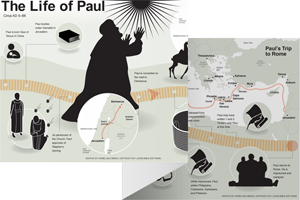1:1–4 This letter addresses Paul’s colleague Titus, urging him to bring order to the church on the island of Crete, oppose false teachers, and appoint leaders (Titus 1:5). Paul would have written this letter sometime in the mid-60s ad, between his first and second Roman imprisonments (see note on 1 Tim 1:1–2). Paul notes that he plans to send Artemas and Tychicus to Crete, so that Titus can visit him in Nicopolis before winter (Titus 3:12). This suggests that Paul is on a missionary journey; he may even already be in Nicopolis. |
1:1 Paul Like many of Paul’s letters, the greeting begins with Paul identifying himself by name. The first line of the greeting echoes Rom 1:1, where he also refers to himself as a slave and apostle. See Rom 1:1 and note.
 Paul: A Life of Redemption and Transformation
Paul: A Life of Redemption and Transformation
slave Used figuratively to indicate that Paul exhibits the same humility and submission of a slave (compare Rom 1:1). His life serves as an example of godliness to the believers in Crete.
 Humility Devotional
Humility Devotional
 Pauline Self-Designations Table
Pauline Self-Designations Table
apostle A person designated by God to speak and act with special authority. See note on Rom 1:1. This letter instructs Titus (and the Cretans) about the proper conduct of believers.
knowledge of the truth See note on 1 Tim 2:4.
godliness See note on 1 Tim 2:2. Cretans had a reputation for ungodliness (Titus 1:12).
1:2 eternal life See note on Rom 2:7.
God, who does not lie God is trustworthy; His promises are certain (compare Num 23:19; Heb 6:18).
before eternal ages Conveying the purposeful nature of God’s decision—God determined it before time began (compare 1 Cor 2:7; Eph 1:4).
1:3 his message Refers to the gospel message (see Titus 1:9).
message (see Titus 1:9).
God our Savior See note on 1 Tim 1:1.
1:4 Titus A non-Jewish missionary companion of Paul. Titus is mentioned only in the apostle’s letters (e.g., 2 Cor 2:13; Gal 2:3; 2 Tim 4:10).
is mentioned only in the apostle’s letters (e.g., 2 Cor 2:13; Gal 2:3; 2 Tim 4:10).
Titus accompanied Paul to Jerusalem, where the apostles Peter, James, and John affirmed Paul’s ministry to the Gentiles (Gal 2:1–10). Titus also served as Paul’s representative to the church in Corinth, where he helped collect relief funds for the poor believers in Jerusalem (2 Cor 8:6–7). Because of his character and dedication, the apostle Paul and the churches held Titus in high regard (2 Cor 8:18–19). |
common faith The faith common to Jews and Gentiles (non-Jewish people) in Christ. This suggests there was a sizable population of Jews and Gentiles on the island of Crete.
1:5–16 Following the opening greeting (Titus 1:1–4), Paul outlines the qualifications for serving as an elder (vv. 5–9; compare 1 Tim 5:17–22). This list closely reflects the qualifications set forth for overseers and deacons in 1 Tim 3:1–13. Paul then describes the conduct and doctrine of the false teachers (Titus 1:10–16). |
1:5 Crete The fourth-largest island in the Mediterranean, located southwest of Asia Minor (modern Turkey). On his way to Rome as a prisoner, Paul sailed past Crete and docked in the city of Fair Havens (Acts 27:8). Although the book of Acts does not provide details about Paul’s work in Crete, Titus’ presence on the island suggests that Paul or his coworkers had recently planted a church there.
and docked in the city of Fair Havens (Acts 27:8). Although the book of Acts does not provide details about Paul’s work in Crete, Titus’ presence on the island suggests that Paul or his coworkers had recently planted a church there.
what remains may be set in order Implies that the Cretan churches were still relatively young. Titus’ task is to continue the work started by Paul (or his coworkers) so that the churches will receive proper guidance.
appoint elders in every town Paul also charged Timothy with appointing elders (presbyteros), which explains why Paul’s first letter to Timothy and this letter to Titus overlap in content—especially regarding qualifications of leadership (compare 1 Tim 3:1–7 and Titus 1:5–9). See note on 1 Tim 3:1–7.
 Episkopos and Presbyteros Word Study
Episkopos and Presbyteros Word Study
1:6 the husband of one wife Paul promotes fidelity in marriage as an example of how the leaders are to be above reproach in all areas of their lives. See note on 1 Tim 3:2.
1:7 overseer Refers to one appointed to leadership over the local church (Acts 20:28). See note on 1 Tim 3:2.
not addicted to wine All the positive qualities listed in Titus 1:8 would be undermined by the reckless and inappropriate behavior often associated with drunkenness. See note on 1 Tim 3:3.
not greedy for dishonest gain See note on 1 Tim 3:8.
1:9 faithful message Refers to the gospel message (see Titus 1:3 and note).
sound instruction Church leaders must promote ideas that are consistent with the gospel. See note on 1 Tim 1:10.
1:10 idle talkers Compare 1 Tim 1:6; Titus 3:9.
those of the circumcision Refers to Jewish converts to Christianity (e.g., Gal 2:12).
1:11 dishonest gain See note on 1 Tim 3:8.
1:12 Cretans are always liars, evil beasts, lazy gluttons A quotation attributed to the Cretan poet Epimenides (ca. 600 bc).
1:14 Jewish myths A fascination with speculative stories was a hallmark of the false teachings that Paul addresses in 1–2 Timothy and Titus. See note on 1 Tim 1:4.
1:15 To the pure all things are pure Implies that all things from God are acceptable and pure for those whom God has accepted. This saying draws on the Jewish categories of clean and unclean in the context of temple worship and purity laws. Under that system, a person was required to observe dietary laws to be considered clean. For Paul, believers are considered pure solely on the basis of their faith. As a result, all things are clean and permissible for them (see 1 Tim 4:4–5; compare Rom 14:20).
to those who are defiled Those who do not have genuine faith—like the false teachers—are not considered clean before God. Their lack of purity makes all things impure to them.

|
About Faithlife Study BibleFaithlife Study Bible (FSB) is your guide to the ancient world of the Old and New Testaments, with study notes and articles that draw from a wide range of academic research. FSB helps you learn how to think about interpretation methods and issues so that you can gain a deeper understanding of the text. |
| Copyright |
Copyright 2012 Logos Bible Software. |
| Support Info | fsb |
 Loading…
Loading…




 Titus
Titus 